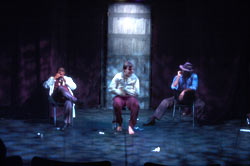Nicholas Robbins’ two new “American absurdist plays,” Sunny Cafe and Gremet, are nothing if not ambitious—with all that double-edged adjective implies. A recent graduate of Cornish, Robbins has concocted a theatrical experience at once brash, boisterous, annoying, fascinating, grasping, loud, and long-winded. These plays careen and crash around the stage like a locomotive with the brakes burned out, scattering a glorious wreckage of ideas and declaring themselves with a tremendous din. Robbins, as both writer and director, reveals a lot of raw talent and verve, and he is well served by a strong cast. Ultimately, however, his total control over the project engenders, ironically enough, a lack of control, as he seems incapable of trimming the fat of his own artistic indulgences.
Sunny Cafe, the less successful of the two plays, presents a surreal slice of slacker life ripped from the ungoverned id of nihilism and paranoia. An extended conversation between two self-involved oddballs—the neurotic and submissive Arson Napalm (Nathan Quiroga) and the berating, mock-philosophical Mac (Jamie Rush)—this piece holds all the hilarity and all the bullshit of a stoned conversation overheard at a bus stop. Robbins shows a strong ear for the bizarre and tangled talk of outsiders; too often, however, the force of his dialogue is undermined and ultimately diminished by too much profanity and an overapplication of sheer volume. The play gains momentum in its second half, as Arson and Mac are forced to confront the limits of their capacity for empathy. Ultimately, though, Sunny Cafe is just too long and too loud.
Like its predecessor, Gremet is unfocused and overlong, but it is also more original and interesting. Here, a hostage situation becomes an extended meditation on authorship and being, as the title character (Gabriel Tallent Smith) comes to realize his true captors could be, by turns, himself, the audience, and the playwright. In the final act, Robbins quite literally tears down the fourth wall, as the action onstage moves into the peanut gallery and then right out the door. Conceptually, the piece is unwieldy and not entirely successful—there’s a little too much Being Nicholas Robbins going on—but it is nonetheless thought-provoking, and something of a daring move.








